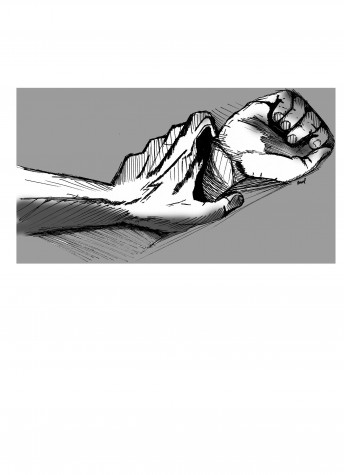Society submits to rape culture
Rape culture is an environment in which beliefs and practices encourage behaviors leading to rape, normalizing sexual violence. Recently, many have taken a stand to shine light on the issue.
At the 88th Annual Oscars Awards Show, Lady Gaga sang “Till it Happens to You” as several survivors of sexual assault, branded with words of resilience and courage on their forearms, walked out from behind the stage to stand alongside Gaga.
There’s been a huge shift in attitudes towards rape and victimization over the past decade.
We are more supportive of victims and take sexual violence and harassment more seriously as crimes. What we need to do now is focus on prevention. We need to address the aspects of our culture that perpetuate behaviors of sexual abuse.
Rape culture satisfies our lust for power and makes us feel more powerful, successful. As Americans we’re so focused on individual accomplishment that our success, and therefore authority over others, is what we value most.
And since success is a measure of self worth in American culture, rape culture increases our sense of self worth. But at what cost?
Approximately 284,350 people reported rape or sexual assault in 2014, according to the U.S. Department of Justice National Crime Victimization Survey. That means that an American is sexually assaulted every 110 seconds.
We, as members of a society that are still troubled by rape and sexual assault cases much too often, send messages that it is okay to display our authority through others’ submission. We’re telling people it’s okay to dominate someone. We even sexualize it.
Popular fashion brands such as Dolce & Gabbana, Calvin Klein and American Apparel have published controversial photos that blatantly portray gang rape, bondage, forced sex, and pornography scenes. These brands sell power and sex, glamorizing rape and inequality among sexual partners.
Sexual violence is an effective advertising tool because it expresses authority and power.
Of course, sex in general sells. But scenes depicting one person physically controlling another are appealing to those who feel powerless in their own lives.
Seeing these messages, whether or not we are conscious of their implications, normalizes sexual violence. Its scenes are casually incorporated into our everyday lives, so it’s no surprise that we dismiss the severity and seriousness of such abuse.
More than 50 percent of the victims of even the most serious incidents (e.g., forced penetration) say they do not report the event because they do not consider it “serious enough,” according to the AAU report.
Rape jokes and messages parading sexual violence are a norm on any high school or college campus. They mask a traumatic and debasing experience as an arrogance-bolstering joke.
And when you’re just trying to fit in at school, no one wants to be the one who cockblocks two people about to hook up, even if one of the two clearly isn’t fit to make moral judgements.
A little less than half of the students surveyed have witnessed a drunk person heading for a sexual encounter, according to a report on sexual assault and sexual misconduct by the Association of American Universities. Among those who reported being a witness, most did not try to intervene.
 But sexual abuse can destroy a person’s self confidence, shattering that person’s sense of free will and the ability to choose and act for oneself.
But sexual abuse can destroy a person’s self confidence, shattering that person’s sense of free will and the ability to choose and act for oneself.
In February, a New York judge denied singer-songwriter Kesha’s appeal to break her contract with producer Lukasz Gottwald, whom Kesha has accused of using his authority to sexually, physically, verbally and emotionally abuse her.
Kesha’s case has gotten a lot of support. She is a well-known artist whose craft is self-expression. Yet the person who was supposedly promoting her interests and representing her has taken away her career, smothering her voice.
It’s not enough to simply address rape as an individual problem. Rape culture is so institutionalized that victims feel unable to speak up about their experiences.
It took Kesha 10 years to press charges against her record producer. But 68 percent of sexual assaults still go unreported, according to the NCVS.
And according to the Department of Justice’s Felony Defendants in Large Urban Counties data, 98 rapists in 100 rape cases walk free.
Everyone is influenced by rape culture. Anyone can become a victim.
And by the time you’ve finished reading this, three more people have become victims.
